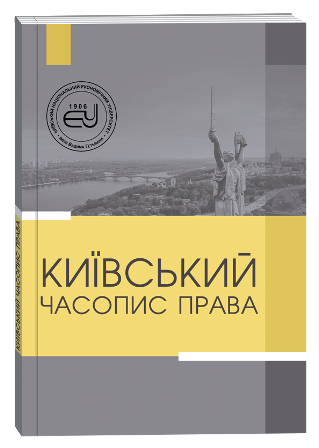DIRECTIONS OF DEVELOPMENT OF ADMINISTRATIVE DELICT LAW IN UKRAINE
DOI:
https://doi.org/10.32782/klj/2025.2.31Keywords:
administrative tort law, administrative liability, Code of Administrative Offenses, reform, European integration, digital transformation, law enforcementAbstract
The article is devoted to the analysis of the current state and prospects for the development of administrative tort law in Ukraine in the context of reforming the legal system, European integration and digital transformation. Administrative tort law is defined as a set of norms regulating social relations related to the implementation of administrative liability for offenses, provided for by the Code of Ukraine on Administrative Offenses (CUaP) and other acts. The paper considers theoretical developments in this sub-branch of law, in particular the concept of an administrative offense (V. V. Reshota), the functional approach (O. Yu. Salmanova), the issue of codification (M. M. Sorochyshyn) and European influence (Yu. A. Tikhomyrov).The state of study of the problem by Ukrainian scientists, such as O. V. Panasyuk, O. Yu. Salmanova, M. M. Sorochyshyn, V. V. Reshota, and foreign authors, is investigated. Key problems in the application of administrative norms were identified: the obsolescence of the Code of Administrative Offenses, contradictions with other laws, the vagueness of subjects of responsibility, the low efficiency of penalties, procedural difficulties and the impact of martial law. The problems of the application of administrative liability were separately analyzed, in particular, the vagueness of the criteria for bringing charges, insufficient differentiation of sanctions, limited legal protection, low qualifications of officials and violation of the deadlines for considering cases during the war period. The conclusions emphasize that theoretical developments are ahead of practical implementation, and modern challenges require comprehensive reform. The modernization of the Code of Administrative Offenses taking into account digital offenses, harmonization with EU norms, the introduction of an electronic system for recording cases, the revision of sanctions, the improvement of the qualifications of officials, simplification of appeals, adaptation to martial law and the activation of scientific and practical cooperation are proposed. The article emphasizes the importance of administrative tort law for law and order and the need for its adaptation to modern conditions.
References
Панасюк О. В. Джерела адміністративно-деліктного права України: становлення та сучасний стан. Вісник Пенітенціарної асоціації України, 2020, № 2. С. 83-93.
Решота, В. В. Функції джерел адміністративного права. Актуальні проблеми вітчизняної юриспруденції, 2016. Вип. 6. Т. 1. С. 103-106.
Салманова, О. Ю. Дискусії щодо проблемних питань чинності адміністративно-деліктного законодавства. Сучасні проблеми правового, економічного та соціального розвитку держави: тези доп. ХІІІ Міжнар. наук.-практ. конф. Вінниця: ХНУВС, 2024. С. 105-107.
Сорочишин, М. М. Актуальні проблеми адміністративно-деліктного права України: матеріали круглого столу. Вінниця: ХНУВС, 2024. С. 152-154.
Тихомиров, Ю. А. Административное право и процесс: полный курс. Москва: Юридическая литература, 2001. 652 с.
Коваленко, І. П. Проблеми реформування адміністративного законодавства України. Юридичний вісник України, 2023, № 3. С. 42-49.
Гриценко, О. М. Адміністративна відповідальність у сфері захисту даних. Право України, 2022, № 5. С. 75-82.
Литвиненко, В. С. Адміністративне право в умовах воєнного стану. Науковий вісник Ужгородського університету, 2023. Вип. 4. С. 20-25.








